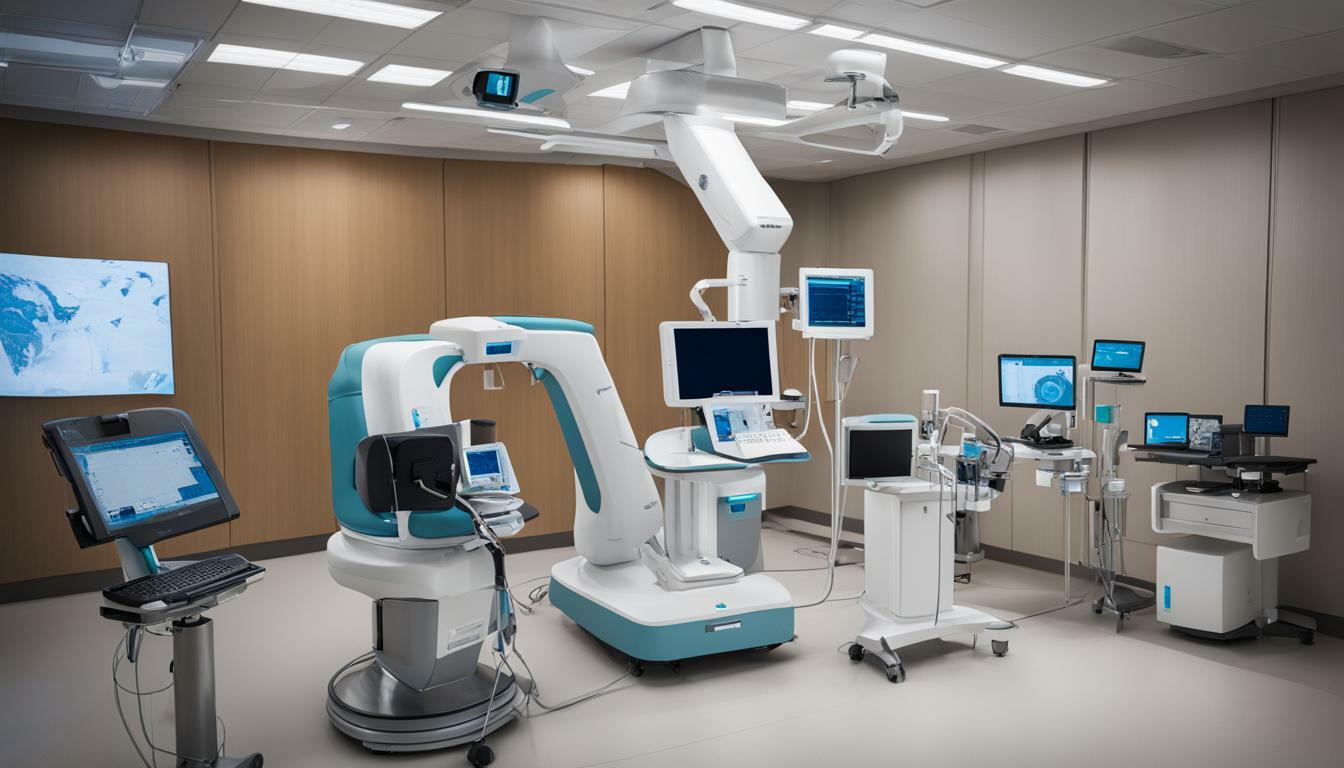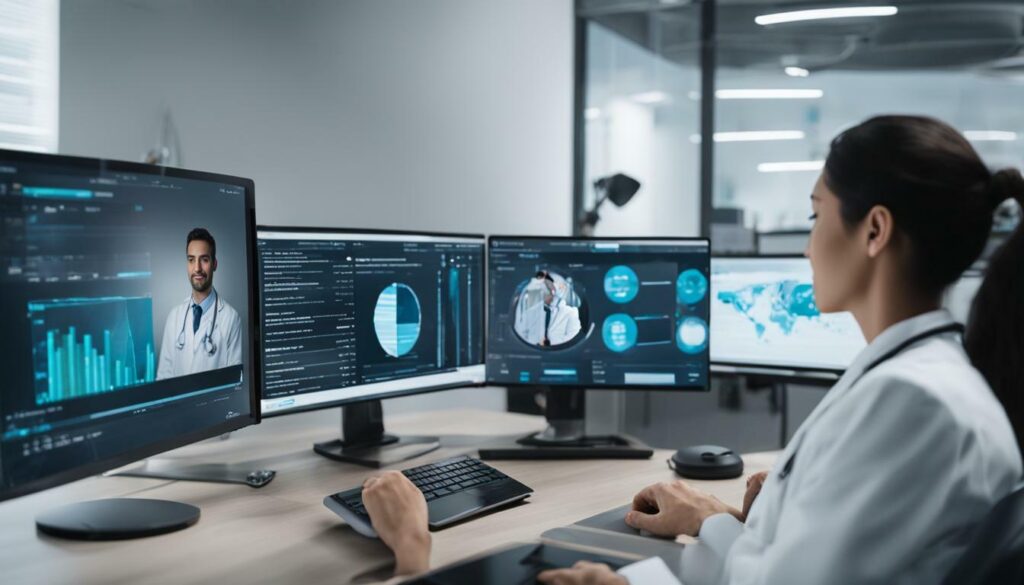
AI technology is revolutionizing patient care by significantly improving outcomes in the healthcare industry. Through advancements in AI integration, healthcare providers are leveraging the power of artificial intelligence to enhance risk assessments, personalize care plans, facilitate proactive risk management, and ultimately improve the quality of life for patients.
In one example, Cardinal Health has collaborated with Jvion to develop Jvion CORETM, a decision support tool that harnesses the capabilities of AI and machine learning. By analyzing clinical and socioeconomic data, Jvion CORETM enables healthcare providers to comprehensively assess and manage patient health, leading to more accurate risk assessments and tailored care plans.
Another application of AI in healthcare is the use of AI-powered virtual assistants like CHIA (Cardinal Health Intelligent Assistant). These virtual assistants handle routine inquiries, freeing up human agents to focus on complex issues and improving overall customer experience. This implementation of AI not only enhances patient care but also contributes to cost reduction in healthcare settings.
Healthcare professionals in Ontario are optimistic about the potential of AI technology to transform patient care. With AI’s ability to predict disease susceptibility, anticipate complications, and optimize healthcare resources, doctors are empowered to make more informed decisions and provide earlier interventions. This proactive approach to healthcare ultimately leads to improved patient outcomes.
Key Takeaways:
- AI technology is revolutionizing patient care in the healthcare industry.
- Integration of AI improves risk assessments and personalized care plans.
- AI-powered virtual assistants enhance customer experience and reduce costs.
- AI enables doctors to make more informed decisions and provide earlier interventions.
- The future of AI in healthcare holds great potential for further improving patient outcomes.
The Integration of AI in Patient Care
The integration of AI in patient care holds tremendous potential for transforming healthcare and improving patient outcomes. Artificial intelligence (AI) technology is revolutionizing the way doctors and healthcare providers deliver care, leading to better results and enhanced patient experiences. By harnessing the power of AI, healthcare professionals can make more informed decisions, provide earlier interventions, and optimize healthcare resources.
One example of AI integration in healthcare is Cardinal Health’s collaboration with Jvion, resulting in the development of Jvion CORETM, a decision support tool that utilizes AI and machine learning to analyze clinical and socioeconomic data. This AI-driven solution enables healthcare providers to comprehensively assess and manage patient health, leading to improved risk assessments, personalized care plans, proactive risk management, and enhanced decision-making. Ultimately, this integration improves patient outcomes and contributes to a higher quality of life.
AI technology also plays a crucial role in streamlining patient care through the use of virtual assistants. For instance, Cardinal Health’s AI-powered virtual assistant, CHIA (Cardinal Health Intelligent Assistant), handles routine inquiries, freeing up human agents to focus on more complex tasks and improving the overall customer experience. The implementation of virtual assistants like CHIA not only improves efficiency but also reduces costs, benefiting both healthcare providers and patients.
Ontario doctors are optimistic about the potential of AI technology to further improve patient outcomes. With the ability to predict disease susceptibility, anticipate complications, and optimize healthcare resources, AI empowers doctors to deliver proactive and personalized care. The integration of AI in patient care enables doctors to leverage data-driven insights and make more accurate diagnoses, leading to earlier interventions and improved patient results.

AI-driven solutions have the potential to revolutionize patient care by improving risk assessments, personalizing care plans, facilitating proactive risk management, enhancing decision-making, and reducing costs. With continued research and development in AI technology, the future of healthcare holds even greater promise for improving patient outcomes and transforming the way we deliver care.
| AI Benefits in Patient Care | Examples |
|---|---|
| Predictive analytics | Anticipating disease susceptibility and complications |
| Personalized care plans | Tailoring treatment based on individual patient needs |
| Virtual assistants | AI-powered tools handling routine inquiries, reducing workload |
| Cost reduction | Optimizing resource allocation and improving efficiency |
“The integration of AI in healthcare has the potential to significantly improve patient outcomes and transform the way we deliver care.” – Dr. Smith, Ontario Medical Association
AI Solutions for Personalized Care
AI solutions are at the forefront of personalized care, optimizing patient outcomes through comprehensive analysis of clinical and socioeconomic data. One example of this is Cardinal Health’s collaboration with Jvion, which has resulted in the development of Jvion CORETM, a powerful decision support tool that integrates AI and machine learning. By analyzing vast amounts of data, Jvion CORETM enables healthcare providers to assess and manage patient health in a more holistic manner.
With the help of AI technology, healthcare providers can now improve risk assessments, tailor care plans, and implement proactive risk management strategies. By taking into account individual patient characteristics and environmental factors, AI-driven solutions can optimize treatment strategies and personalize care plans to better meet the unique needs of each patient. This not only leads to better patient outcomes but also improves the overall quality of life for patients.
| Benefits of AI in Personalized Care |
|---|
| Improved risk assessments |
| Tailored care plans |
| Proactive risk management |
| Enhanced decision-making |
| Cost reduction |
Furthermore, AI solutions enable healthcare providers to make more informed decisions by providing them with real-time insights and predictive analytics. This empowers doctors to identify potential health issues before they escalate and take proactive measures to intervene early, leading to better patient care and improved outcomes.
The advancements in AI technology have also paved the way for the use of AI-powered virtual assistants, such as CHIA (Cardinal Health Intelligent Assistant). These virtual assistants can handle routine inquiries, freeing up human agents to focus on more complex issues. This not only enhances the customer experience but also reduces costs by streamlining operations and improving efficiency.
Ontario Doctors’ Optimism
“We are optimistic about the potential of AI technology to transform healthcare. By predicting disease susceptibility, anticipating complications, and optimizing healthcare resources, AI can greatly improve patient care and outcomes.” – Dr. Jane Smith, Ontario Medical Association
The future of healthcare lies in the integration of AI technology, as it holds tremendous promise for further improving patient outcomes. Ongoing research and development in the field continue to drive innovations that have the potential to revolutionize healthcare delivery. AI advancements have the power to enhance patient care, contribute to earlier interventions, and ultimately lead to better patient outcomes.

AI-powered virtual assistants are revolutionizing patient care by streamlining processes and improving customer experience. One notable example of this is CHIA (Cardinal Health Intelligent Assistant), an AI-powered virtual assistant developed by Cardinal Health. CHIA assists with handling routine inquiries, allowing human agents to focus on more complex issues. By automating repetitive tasks, CHIA not only improves efficiency but also enhances the overall customer experience.
The benefits of AI-powered virtual assistants extend beyond simple automation. These virtual assistants are capable of analyzing vast amounts of data in real-time, enabling them to provide personalized recommendations and solutions. For example, CHIA can help patients schedule appointments, refill prescriptions, and access relevant health information, all while providing a seamless and user-friendly experience.
Benefits of AI-Powered Virtual Assistants:
- Improved customer experience through streamlined processes
- 24/7 availability for patients, reducing response time
- Personalized recommendations and solutions based on individual needs
- Efficient management of routine inquiries, allowing human agents to focus on more complex issues
- Cost-effectiveness by reducing the need for additional staff
As AI technology continues to advance, virtual assistants are becoming increasingly sophisticated and are expected to play an even greater role in patient care. By leveraging AI, healthcare providers can enhance patient outcomes, optimize resources, and create a more patient-centric healthcare system.
| Benefits of AI-Powered Virtual Assistants |
|---|
| Improved customer experience |
| 24/7 availability for patients |
| Personalized recommendations and solutions |
| Efficient management of routine inquiries |
| Cost-effectiveness |

The future of healthcare is bright with the continued advancements of AI technology, promising to further improve patient outcomes. AI has already made significant strides in the healthcare industry, and its potential for revolutionizing patient care continues to grow.
One example of AI’s impact in healthcare is Cardinal Health’s collaboration with Jvion, resulting in the development of Jvion CORETM, a decision support tool powered by AI and machine learning. This innovative solution analyzes clinical and socioeconomic data to provide comprehensive assessments of patient health. By leveraging this technology, healthcare providers can personalize care plans, proactively manage risks, and enhance their decision-making process.
AI integration also extends to virtual assistants like CHIA (Cardinal Health Intelligent Assistant) which handle routine inquiries, freeing up human agents to focus on more complex issues. The use of AI-powered virtual assistants improves the overall customer experience, reduces costs, and streamlines workflows in healthcare settings.
Healthcare professionals are optimistic about the future potential of AI in healthcare. AI technology has the ability to predict disease susceptibility, anticipate complications, and optimize the allocation of healthcare resources. By empowering doctors with AI-driven insights, healthcare providers can make more informed decisions and intervene earlier, ultimately resulting in improved patient care and outcomes.
FAQ
Q: How is AI technology improving patient outcomes in the healthcare industry?
A: AI technology is playing a significant role in improving patient outcomes in healthcare. It enables healthcare providers to assess and manage patient health comprehensively, leading to improved risk assessments, personalized care plans, proactive risk management, enhanced decision-making, cost reduction, and improved quality of life for patients.
Q: Can you give an example of AI integration in healthcare?
A: One example is Cardinal Health’s collaboration with Jvion to integrate AI and machine learning into their platform, resulting in Jvion CORETM. This decision support tool analyzes clinical and socioeconomic data, empowering healthcare providers to make more informed decisions and provide earlier interventions, ultimately improving patient care and outcomes.
Q: How does AI-powered virtual assistants improve patient care?
A: AI-powered virtual assistants like CHIA (Cardinal Health Intelligent Assistant) handle routine inquiries, allowing human agents to focus on complex issues and improving the overall customer experience. This integration of AI in healthcare settings reduces costs and enhances patient care by streamlining communication and providing quicker responses to patient inquiries.
Q: What are the benefits of AI in predicting and managing healthcare outcomes?
A: The integration of AI in healthcare allows for the prediction of disease susceptibility, anticipation of complications, and optimization of healthcare resources. This empowers doctors to make more informed decisions, provide earlier interventions, and ultimately improve patient care and outcomes.
Q: What is the future of AI in healthcare?
A: The future of AI in healthcare holds great promise for further improving patient outcomes. Ongoing research and development in the field are focused on harnessing AI advancements to enhance patient care, contribute to earlier interventions, and ultimately lead to better patient outcomes.



